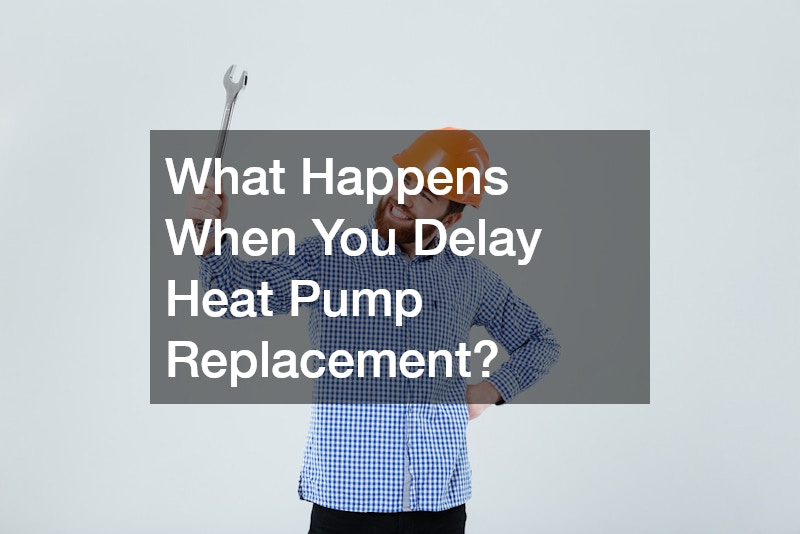Heat pumps are critical components in many households, providing both heating and cooling to ensure a comfortable indoor environment. However, like any mechanical system, heat pumps have a lifespan and eventually need replacement. Delaying a necessary heat pump replacement might seem like a cost-saving measure initially, but it can lead to a host of issues that can be far more expensive and troublesome in the long run. In this article, we will explore the consequences of postponing heat pump replacement and discuss why timely intervention is essential.
Decreased Energy Efficiency
One of the primary disadvantages of delaying heat pump replacement is the significant decrease in energy efficiency. Heat pumps that are past their prime often struggle to maintain the desired indoor temperature. As a result, they consume more energy than necessary, which can lead to skyrocketing utility bills. Furthermore, older heat pump models are inherently less efficient than newer models, which have advanced technology designed to maximize performance. Consequently, the longer you wait to replace your heat pump, the more money you might end up losing in increased energy costs.
Over time, as a heat pump ages, its components begin to wear out, leading to reduced efficiency and performance. The compressors and fans, in particular, can become less effective, causing the system to work harder and longer to reach the desired temperature. This not only leads to increased wear and tear but can also result in higher energy consumption. The technology used in newer heat pumps often includes improved compressors and fans which can operate more quietly and efficiently, reducing both operational noise and energy usage. Therefore, delaying heat pump replacement keeps you from benefiting from these technological improvements, increasing your energy expenditures instead.
Increased Repair Costs
As a heat pump ages, it becomes more prone to malfunctions and eventually requires more frequent repairs. While small repairs might seem minor at first, they can quickly add up in terms of cost, especially if the system continues to deteriorate. Delaying heat pump replacement often means gambling with potential breakdowns during peak heating or cooling seasons when the system’s demand is highest, leading to emergency repairs. The unpredictability of these costs can strain household budgets. By replacing an old and inefficient heat pump on time, homeowners can avoid these unexpected expenses.
Furthermore, older heat pumps can have difficulty sourcing parts due to outdated components, driving repair costs even higher. With manufacturers continuously innovating, parts for older models may become scarce or even unavailable, leading to increased repair times and costs. This situation can leave homeowners in a bind, especially during extreme weather conditions where the system is most needed. A new heat pump not only comes with readily available parts but also often includes a warranty that can cover certain repairs, protecting homeowners from out-of-pocket expenses. Therefore, timely heat pump replacement can provide both financial and practical peace of mind.
Impacted Indoor Air Quality
An often-overlooked aspect of heat pump replacement delay is its impact on indoor air quality. Older heat pumps can harbor mold, dust, and other allergens due to accumulated debris in the system’s air ducts and filters. As a system ages and its efficiency declines, it can struggle to properly filter and circulate air throughout the home, potentially leading to a buildup of allergens and pollutants. This can pose significant health risks, especially to those with allergies or respiratory issues.
The ductwork associated with older heat pumps might also not be as effective as that connected to newer systems and may exhibit more leaks or blockages. These inefficiencies can result in the circulation of stale or contaminated air. With newer heat pump models, improved filtration systems and advanced air handling can significantly enhance indoor air quality, reducing the presence of airborne contaminants. By delaying heat pump replacement, you risk compromising the air you breathe, which can be remedied by investing in a modern heat pump with superior air filtration capabilities.
Reduced Comfort Levels
Comfort is a primary concern for many homeowners, and an aging heat pump can often fail to provide desired comfort levels. As heat pumps age, their ability to regulate temperature consistently diminishes. Homeowners may experience uneven heating or cooling across different areas of their home, with some rooms feeling too warm while others too cold. This inconsistency can lead to discomfort, driving a need for additional heating or cooling solutions, which increases energy expenses further. A timely heat pump replacement can restore comfort and efficiency, ensuring every room in the house maintains the desired temperature.
An old heat pump can also lead to other comfort-related problems, such as increased noise levels and frequent cycling, which can disrupt daily activities and lead to an uncomfortable home environment. Newer heat pump models are designed with advanced noise reduction technologies, offering whisper-quiet operation, which enhances overall comfort. Moreover, modern systems are capable of maintaining consistent temperatures without the constant on-and-off cycles that characterize aging units. A new heat pump can vastly improve your home’s living conditions, ensuring comfort without efficiency sacrifices.
Ultimately, being proactive about heat pump replacement can have a substantial impact not only on your home’s performance but also on your overall quality of living. Therefore, rather than delaying the inevitable, consider planning for a timely replacement that offers peace of mind, improved efficiency, and consistent comfort. Take action today and explore options for an upgrade that fits your budget and delivers the benefits your home deserves.



